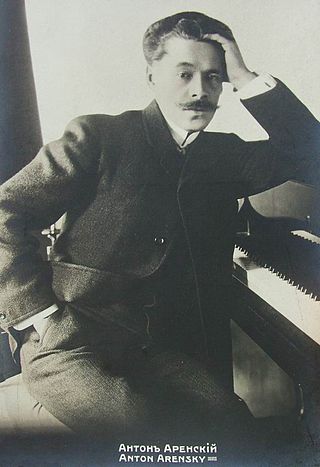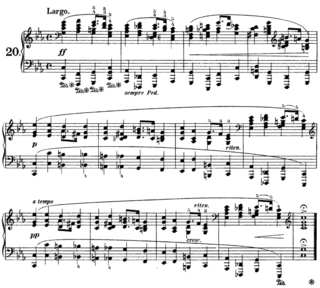
The Morceaux de salon (Salon Pieces), Op. 6, are a set of two pieces for piano and violin composed by Sergei Rachmaninoff in 1893. [1]

The Morceaux de salon (Salon Pieces), Op. 6, are a set of two pieces for piano and violin composed by Sergei Rachmaninoff in 1893. [1]
The two Morceaux de salon were composed in the summer 1893, when Rachmaninoff was already established as a composer and pianist. His Morceaux de fantaisie , Op. 3, had already been published, and he had completed the Suite for two pianos, Op. 5. The Morceaux de salon are similar in scope and structure to the Pieces for cello and piano, Op. 2, which consists of a Prélude, and a Danse orientale. [2] It is likely that they were dedicated to Julius Conus, whose son would later marry the daughter of Rachmaninoff.
| External audio | |
|---|---|
| Performed by Akiko Suwanai and Phillip Moll | |
The Morceaux de salon consists of a Romance and a Danse hongroise (Hungarian dance). Both pieces are written in D minor.
A performance takes approximately 11 minutes.
Robert Matthew-Walker writes that "such is the composer's mastery of violin writing (though he may well have enlisted Conus's assistance in this regard) that one regrets that he did not leave a more extended work for the instrument". [2]

Sergei Vasilyevich Rachmaninoff was a Russian composer, virtuoso pianist, and conductor. Rachmaninoff is widely considered one of the finest pianists of his day and, as a composer, one of the last great representatives of Romanticism in Russian classical music. Early influences of Tchaikovsky, Rimsky-Korsakov, and other Russian composers gave way to a thoroughly personal idiom notable for its song-like melodicism, expressiveness and rich orchestral colours. The piano is featured prominently in Rachmaninoff's compositional output and he made a point of using his skills as a performer to fully explore the expressive and technical possibilities of the instrument.

Henri François Joseph Vieuxtemps was a Belgian composer and violinist. He occupies an important place in the history of the violin as a prominent exponent of the Franco-Belgian violin school during the mid-19th century. He is also known for playing what is now known as the Vieuxtemps Guarneri del Gesù, a violin of superior workmanship.

Anton Stepanovich Arensky was a Russian composer of Romantic classical music, a pianist and a professor of music.

Nikolai Karlovich Medtner was a Russian composer and virtuoso pianist. After a period of comparative obscurity in the 25 years immediately after his death, he is now becoming recognized as one of the most significant Russian composers for the piano.

Six moments musicaux, Op. 16, is a set of solo piano pieces composed by the Russian composer Sergei Rachmaninoff between October and December 1896. Each Moment musical reproduces a musical form characteristic of a previous musical era. The forms that appear in Rachmaninoff's incarnation are the nocturne, song without words, barcarolle, virtuoso étude, and theme and variations.
Sergei Rachmaninoff's Trio élégiaque No. 2 in D minor, Op. 9 is a piano trio which he began composing on 25 October 1893 and completed on 15 December that year. It was written in memory of Tchaikovsky, and was inscribed with the dedication "In Memory of a Great Artist". It was first performed in Moscow on 31 January 1894 by Rachmaninoff himself, the violinist Julius Conus, and the cellist Anatoli Brandukov.
Sergei Rachmaninoff's Prelude in C-sharp minor, Op. 3, No. 2, is one of the composer's most famous compositions. Part of a set of five piano pieces titled Morceaux de fantaisie, it is a 62-bar prelude in ternary (ABA) form. It is also known as The Bells of Moscow since the introduction seems to reproduce the Kremlin's most solemn carillon chimes.
E-flat minor is a minor scale based on E♭, consisting of the pitches E♭, F, G♭, A♭, B♭, C♭, and D♭. Its key signature consists of six flats. Its relative key is G-flat major and its parallel key is E-flat major. Its enharmonic equivalent, D-sharp minor, contains the same number of sharps.
Arseny Nikolayevich Koreshchenko was a pianist and composer of classical music, including operas and ballets. He was from the Russian Empire.

Carl Joachim Andersen was a Danish flutist, conductor and composer born in Copenhagen, son of the flutist Christian Joachim Andersen. Both as a virtuoso and as composer of flute music, he is considered one of the best of his time. He was considered to be a tough leader and teacher and demanded as such a lot from his orchestras but through that style he reached a high level.

The Morceaux de salon, Op. 10, are a set of pieces for solo piano composed by Russian composer Sergei Rachmaninoff in 1894.

Variations on a Theme of Chopin, Op. 22, is a group of 22 variations on Frédéric Chopin's Prelude in C minor, composed by Sergei Rachmaninoff in 1902–03. In the first edition, it is noted that 3 of the variations and the final Presto section can be omitted if the performer wishes.

The composer Sergei Rachmaninoff produced a number of solo piano pieces that were either lost, unpublished, or not assigned an opus number. While often disregarded in the concert repertoire, they are nevertheless part of his oeuvre. Sixteen of these pieces are extant; all others are lost. Ten of these pieces were composed before he completed his Piano Concerto No. 1, his first opus, and the rest interspersed throughout his later life. In these casual works, he draws upon the influence of other composers, including Frédéric Chopin and Pyotr Tchaikovsky. The more substantial works, the Three Nocturnes and Four Pieces, are sets of well-thought out pieces that are his first attempts at cohesive structure among multiple pieces. Oriental Sketch and Prelude in D minor, two pieces he composed very late in his life, are short works that exemplify his style as a mature composer. Whether completed as a child or adult, these pieces cover a wide spectrum of forms while maintaining his characteristic Russian style.

Wilhelm Karl Friedrich Fitzenhagen was a German cellist, composer and teacher, best known today as the dedicatee of Pyotr Ilyich Tchaikovsky's Variations on a Rococo Theme.

Edward Potjes was a Dutch-born composer and piano virtuoso.

Paul Lacombe was a Languedocien (French) composer and pianist.
Morceaux de salon may refer to:
Géza Horváth was a Hungarian composer, arranger and music school director who worked in Vienna.